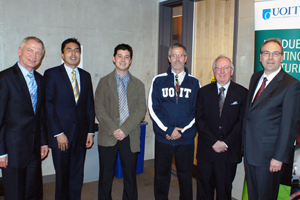Packed house takes in UOIT’s annual Purdue Pharma Distinguished Lecture
Leading McGill University researcher addresses the issue of vaccines
April 22, 2011

Vaccination programs in Canada and around the world are widely credited with dramatically decreasing the incidence of life-threatening diseases since the first vaccine for smallpox was developed over 200 years ago. Throughout the 20th century, many new vaccines came on stream which put a major dent in diseases like measles, diphtheria, pertussis, mumps and all but eradicated polio. Yet, in the past 20 years, McGill University researcher Dr. Brian Ward says there is growing evidence of a general societal lack of confidence in vaccines.
“With the influx of anti-vaccination websites on the Internet and the attention given to highly publicized cases like the now-proven-false 1998 claim by British physician Dr. Andrew Wakefield that the measles, mumps and rubella (MMR) vaccine could cause autism in children, perhaps it isn’t a surprising sentiment,” says Dr. Ward, an associate professor at the Montreal, Quebec university and the chief of the Division of Infectious Diseases at McGill. “Negative propaganda existed even in the time of the first smallpox vaccine. But if vaccines stop, diseases will come back. Polio vaccines were stopped in many areas in 2004 when it had been isolated to just seven countries on the globe. Polio has since spread to 34 nations.”
Dr. Ward presented his highly engaging and informative lecture Vaccine Safety: Myth versus Reality at the fourth annual Purdue Pharma Distinguished Lecture hosted by the Faculty of Science at the University of Ontario Institute of Technology (UOIT). To watch the lecture, please visit the UOIT Mediasite link: http://mediasite.uoit.ca/mediasite/SilverlightPlayer/Default.aspx?peid=7a40576f22f544db8fb2a504e28afde4.
“The most commonly held myths are that vaccines are not necessary, they don’t work, they aren’t safe and that childhood diseases are disappearing anyway,” says Dr. Ward. “People sometimes deny facts for emotional reasons. They are sometimes skeptical of companies that make vaccines, arguing that everything is about profit. It is true that no vaccine is 100 per cent effective. They may not be perfect in all instances, but they are close. We are losing ground to some diseases making a return and this challenge must be met with good science.”
“The lecture theatre was standing room only for Dr. Ward’s presentation, so we are delighted there was so much interest in hearing what he had to say,” said Dr. William Smith, dean, Faculty of Science. “We owe a great deal of gratitude to Purdue Pharma for its unwavering support of this lecture series.”
“This lecture provides a tremendous opportunity to learn about the work of world-class researchers,” said Randy Steffan, director, Corporate Affairs and Communications, Purdue Pharma. “Purdue Pharma is pleased to continue its association with this important annual event and its support of UOIT’s Faculty of Science.”
Established in 2008, the annual UOIT Purdue Pharma Lecture aims to provide students with information about how current developments affect the health of Canadians while creating a forum for students and the community to connect with leading scientists.
Based in Pickering, Ontario, Purdue Pharma is a leading pharmaceutical company that generously funds the lecture series and has enthusiastically supported UOIT since the university’s inception. Working together, Purdue Pharma and UOIT endeavour to encourage students to take an active interest in the sciences and provide them with opportunities to explore career and research options within the health science industry and beyond.
About Ontario Tech University
A modern, forward-thinking university, Ontario Tech advances the discovery and application of knowledge to accelerate economic growth, regional development and social innovation. We inspire and equip our students and our graduates to make a positive impact in a tech-focused world. For us, it’s not only about developing the next tech breakthrough. Understanding and integrating the social and ethical implications of technology differentiates us as university. Learn more at ontariotechu.ca.
Media contact
Bryan Oliver
Communications and Marketing
Ontario Tech University
905.721.8668 ext. 2209
bryan.oliver@uoit.ca



